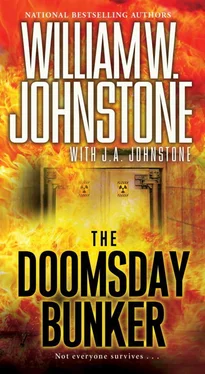Then that anxiety had receded after the fall of the Soviet Union, only to resurface with new faces behind the bombs. It wasn’t missiles people worried about now, but rather truck bombs or suitcase nukes or drone payloads being wielded by Islamic terrorists. As so-called “refugees” from the Middle East continued to flood into the country over the objections of nearly everybody except the politicians in Washington, people couldn’t help but wonder how many of those young men came to America seeking not sanctuary but rather an opportunity to sow carnage.
The trouble didn’t necessarily have to come from overseas, either. Plenty of it was already here in the form of homegrown terrorists, the children of legal immigrants from earlier generations who had been corrupted by a ceaseless barrage of hate coming from their Middle Eastern cousins. And so there were bombings, shootings, stabbings, all sorts of violence, and the worst part of it was… you never knew where it was coming from. No wonder people were stressed out.
Throw in the racial unrest relentlessly stoked by politicians, so-called community leaders, and the media, and it was hard to leave home without thinking, Well, this might be the time when I don’t come back.
That didn’t even take into account all the little things that could kill you, like some new superbug resistant to any treatment, or the rising tide of cancer—God, Larkin couldn’t even begin to count all the friends and acquaintances he had lost to one form or another of cancer !—or the dementia that seemed so much more prevalent than it used to be, or an allergic reaction to some common, everyday food or item, or the stress and depression that led people to medicate themselves into a stupor until it finally seemed that ending it all was the easiest way out…
Were there still good things in the world? Sure, logically Larkin knew that there were. But sometimes it was hard to pick them out from the tsunami of crap that seemed to be washing over everything.
By the time he got back to his nice, comfortable house, he was feeling anything but comfortable. Graham Moultrie had made plenty of good points, and from what Larkin could tell, the Hercules Project was being developed into the sort of safe, secure place where somebody really could ride out all sorts of catastrophes.
He glanced down at the brochure lying on the seat beside him. The prices were high, but not out of reach. One of those apartments in the old missile silos could be had for $80,000 per person. The more spare accommodations along the main corridors went for $60,000 per person, and space in the barracks-like lower level was 50 grand per. Kids under the age of fifteen were half-price. The down payment/deposit was 20 percent of the total. It could be done, Larkin thought as he parked in the garage and then picked up the brochure from the seat.
Susan’s sedan was parked in the garage, too. He had left the house before she was awake, but she would be up now, getting ready to head to the hospital for her shift. He went in through the garage, into the kitchen, and found coffee in the old-fashioned coffeemaker. He’d never cared for those new ones with the plastic cups and pods and things.
As he poured himself a cup, she came into the kitchen fully dressed in her scrubs but toweling her hair dry. “I saw your note saying you’d gone to run an errand,” she said. “Get it taken care of?”
“Yeah, maybe.”
“What’s your plan for this afternoon? Going to get some pages done?”
“Thought I would.”
“Maybe you could unload the dishwasher, too?”
“Sure,” Larkin said. After everything he had seen and thought about this morning, worrying about dirty dishes seemed almost trivial beyond belief, but Susan was right: life went on, and that included all the mundane chores that went with it.
Yeah, life went on… until it didn’t.
“If you’ve got a few minutes, there’s something I’d like to talk to you about.”
Susan looked at him and frowned. “This isn’t a situation , is it? I hate situations.”
Larkin laughed and shook his head. Any time one member of a couple announced that they had a “situation,” it almost always wasn’t good.
“No. You know I went to lunch with Adam Threadgill the other day.”
“You have lunch with Adam every week unless something comes up.”
“Yeah, but this time he was telling me about this new place west of town—”
“A new place to eat? Ooh, I like the sound of that.”
Larkin made a face and shook his head. “Well, they have food there, but it’s not exactly a restaurant.”
“A bar? I’m not much on bars, you know that.”
“It’s more of a place you go and stay.”
“A bed and breakfast? A resort? Those places are expensive. Although, if you wanted to call it, like, a second honeymoon…”
Larkin sighed and held out the brochure to her. “Just take a look and think about it, all right. I took a tour of the place and can tell you all about it.”
Susan glanced down at the brochure, which had a mushroom cloud on the folded front. She looked right back up and said, “No. This is some sort of crazy fantasy, Patrick.”
“I wish it was.”
She pushed the brochure back in his hand and snapped, “I have to get to work.”
“Then we’ll talk about it later—”
“There’s nothing to talk about. However much this costs, we can find better ways to spend the money.”
“Better ways than survival?”
She just looked at him, shook her head, and walked out of the kitchen.
* * *
That was the way it had been ever since, Larkin bringing up the subject from time to time, Susan refusing to even talk about it… but gradually getting less steadfast in her refusal. Larkin hoped that was because some of his arguments, even the snippets of them she listened to, were getting through to her. The fact that the news seemed to be getting worse and worse all the time probably had an effect, too.
In making the arguments to her, he realized he was making them to himself as well. When he’d driven away from the Hercules Project, he had been undecided about what was the right thing to do. Moultrie had made a compelling case, and so had the things Larkin had seen with his own eyes. But he’d been raised to be frugal, and spending a chunk of money that big just went against the grain for him, even when it was in a good cause. He’d had doubts about nearly every big purchase he had ever made in his life, he recalled, and most of them had turned out just fine. Not just fine, but in some cases downright great. So history told him—in more ways than one—that he didn’t have any reason to drag his feet about this.
No reason other than getting Susan to see the practicality of it, too.
After their conversation about “the new normal” the night before, he hadn’t said anything else about the idea. This morning he had coffee and breakfast—pancakes, scrambled eggs, and bacon—ready when she came into the kitchen. He wasn’t trying to suck up to her; since retiring, he had discovered that he actually liked cooking… as long as it was basic stuff and didn’t get too complicated.
She was still in her nightgown and looked great to him. He enjoyed the casual intimacy of their decades-long marriage. He was about to say good morning to her when she walked through the kitchen and on into the living room. The open-concept design of the whole living area allowed him to watch her as she picked up the remote and aimed it at the TV. The big screen came on.
“I had the TV on in the bedroom,” she said as she glanced over her shoulder at him. “This was on.”
“—shooters’ motive is unknown at this time,” a solemn voice was saying over an apparent live shot of what appeared to be a mall somewhere. A graphic listing the town of Pembroke Pines, Florida, was at the bottom of the screen. Emergency vehicles were parked around the mall, but that was all that could be seen because members of the media were being kept back a considerable distance. “There are reports of multiple fatalities, and at least a dozen injured have been transported to nearby medical facilities. There appear to have been at least three shooters, and as far as we know they are still active inside the mall. Police have cordoned off the area, and we believe that SWAT teams have gone in—Oh, my God! What was that?”
Читать дальше









